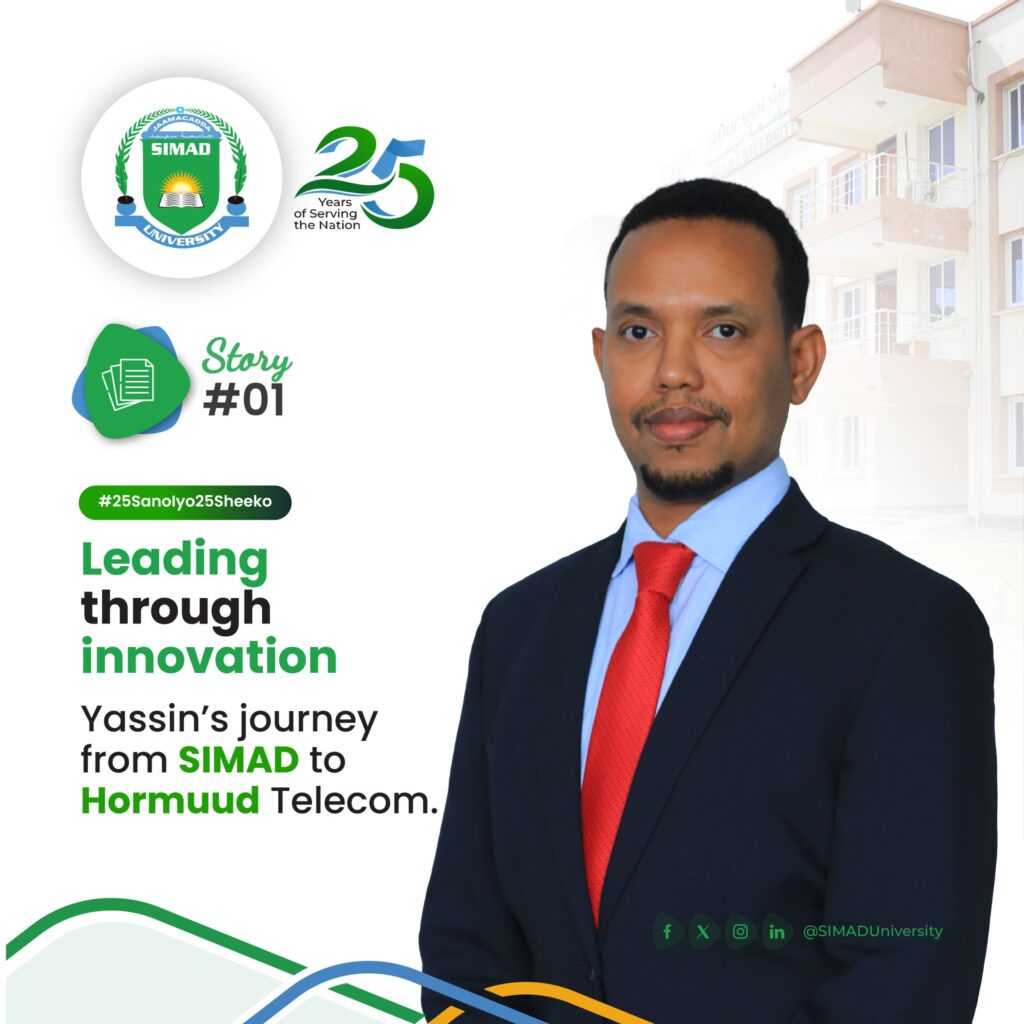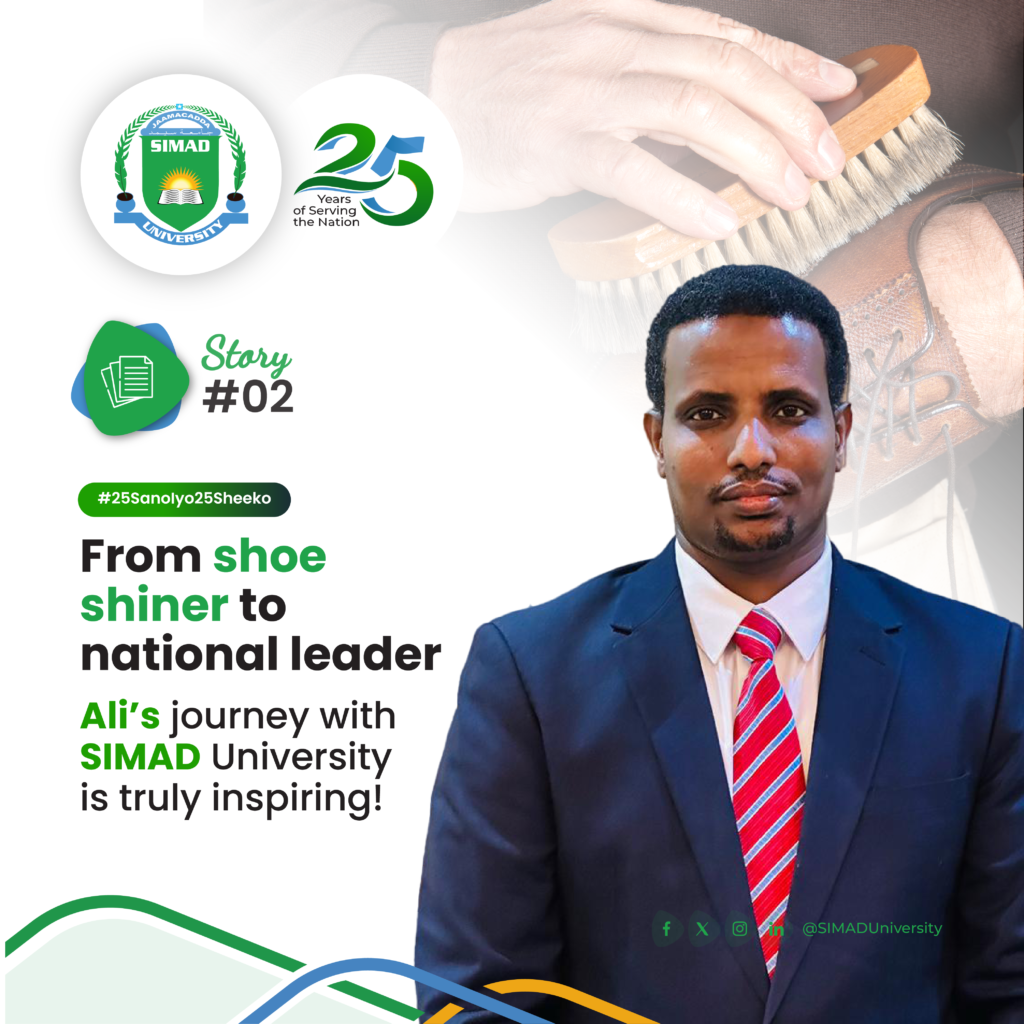Badal Shiekh Mohamed Kulmiye
Badal Shiekh Mohamed Kulmiye is the Managing Director of Signjet Printing Company in Mogadishu, Somalia, and a board member of Sagaljet Printing Company in Hargeisa. He is also the Founder and Manager of both Guangzhou Kulmiye Trading Company in Guangzhou, China, and Yiwu Kulmiye Export and Import Company Ltd in Yiwu, China. In his strategic leadership roles across these companies, Badal has over 20 years of experience in advertising and international trade.
Badal has significantly contributed to the growth and development of the Somali printing and advertising industry by training and coaching many talented Somali youths. Many of these individuals are now in managerial positions or are owners and co-owners of printing houses in Somalia. His story is closely tied to the history of SIMAD University, where he holds the honour of having designed the university’s logo.
I joined SIMAD in 2002 and graduated in 2006 with a Bachelor of Information Technology. In 2007, I enrolled in a Master of Business Administration program at the Islamic University in Uganda, graduating in 2009. I am a technical engineer specialising in large-format inkjet printers, laser cutting machines, CNC router machines, and embroidery machines. Over the past 15 years, I have successfully installed more than 200 units.
I started my career as an assistant signboard technician at a young age, as this was our family business. My elder brother, Khalif Sheikh Mohamed Kulmiye, who managed Jubba Arts, had a vision to modernise the business from manual hand painting to digital printing. To be part of this modernization, I needed computer-based knowledge, which led me to join the two-year Diploma in Information Technology program at SIMAD in 2002. I graduated from SIMAD University in 2006 with a Bachelor of Science in Information Technology.
The vision for modernising the business began in 2005 when my brother started a new venture, Signjet Printing Company. After graduation, I joined Signjet to be part of the business transformation. As the operations manager, I realised the need for management skills alongside my technical knowledge in computer science. Believing in my leadership abilities, I actively engaged in student-led initiatives and organised various events on campus, contributing to the community.
In 2007, I went to Uganda to pursue a Master’s degree at the Islamic University in Uganda. I started an MBA program to gain managerial skills to complement my computer science degree and graduated in 2010. This education provided me with both technical and administrative leadership capacity. I returned to the Signjet Printing Company to continue my job, now equipped with the knowledge to transform the business from manual hand-painted signboards to fully digital printing processes.
From 2010 to 2011, I focused on administrative and technical improvements. Realising that our existing equipment and knowledge were insufficient to meet our service goals, I decided to take on the responsibility of research and development.
In July 2011, I travelled to China to buy machines and materials and to gain knowledge on how to use them. At that time, it was difficult to bring foreign experts to install new machines and train our staff due to security concerns. This is where I applied the knowledge I had gained from SIMAD.
From 2011 to 2020, I focused on acquiring new machines, receiving training, sourcing suitable materials, importing these machines and materials to the country, and training machine operators, technicians, and salespeople. I also took responsibility for expanding these projects outside Mogadishu, reaching nearly all major cities in the country. We now have more than 25 shops nationwide.
In 2020, my elder brother retired, and I took full leadership responsibility of the business. I have trained many people to be part of the management team and am proud to have established a team capable of running the business independently.
Signjet now employs over 200 full-time staff, most of whom have been trained within the company and offered job opportunities upon acquiring the necessary skills. Signjet has nine branches across the country.
In addition to Signjet, we have established other brands: Sagaljet Printing Company in Somaliland with nine branches in major cities, Horyaljet Printing Company in Puntland with six branches, and Kismayjet in Jubaland. We have also expanded internationally with Sagaljet Printing in Djibouti and JijigaJet in the Somali state of Ethiopia.
I have focused on the printing and advertising industry since graduating from SIMAD University and have found great success in this field.
This industry has deep roots in my family. My elder brother, Abdurrahman Sheikh Mohamed Kulmiye, was an artist who began our family business in 1972 with Sagal Arts, where he hand-painted slogans with a brush. Another elder brother, Khalif Sheikh Mohamed Kulmiye, followed in his footsteps, starting Jubba Arts in 1982. Khalif is the founder of both Signjet and Sagaljet, which inspired my interest in this industry.
Since joining this industry, I have led many successful research and development projects. When I joined Signjet and Sagaljet, they were the only companies providing digital printing advertising services in Mogadishu and Hargeisa, respectively, with fewer than 30 employees combined. Today, Signjet and Sagaljet employ over 500 people across more than 20 locations. The knowledge we brought into the country enabled other entrepreneurs to invest in this industry and hire the trained and skilled employees we developed. The two small shops we started nearly 20 years ago have grown into reputable companies, contributing to an industry that now employs thousands nationwide.
The biggest challenges I faced were technical know-how and material availability. The printing industry requires various skilled staff such as designers, machine operators, and mechanics, none of which were readily available in the country. Additionally, there was no single supplier of printing materials, as this industry was non-existent at the time.
Initially, I sought technical support from machine manufacturers, but they uniformly responded, “We cannot provide warranty and technical support in Somalia; you can buy machines at your own risk.” We also attempted to hire designers from abroad, but none were willing to work in Somalia.
To overcome these obstacles, I decided to go to China to buy machines and receive training. This is how I acquired the necessary technical knowledge for the printing industry. I then trained many staff members for Signjet and Sagaljet, who have become the backbone of the printing industry across the country. Many printing companies in Somalia now employ individuals who benefit from this training. To address design challenges, I provided on-the-job training for talented Somali youth.
For raw materials, the only viable solution was to invest in our supply chain and purchase all the materials needed for our operations.
Impact of SIMAD Education
My experience and education at SIMAD University prepared me to excel in both the academic and business worlds.
Had I not been educated at SIMAD University, I would not have been able to solve the technical know-how issues of the printing industry. All my training in machine installation and maintenance was built on the foundation of my Bachelor of Science in Information Technology from SIMAD University.
The skills and knowledge I gained at SIMAD University have made me an effective manager capable of leading a technology-based company. Today, both Signjet and Sagaljet use Enterprise Resource Planning (ERP) systems to record all transactions, both financial and non-financial. This allows me to access the system from anywhere and obtain first-hand information rather than relying on processed reports.
Advice to Upcoming Entrepreneurs
To become a successful entrepreneur, it’s essential to acquire the necessary technical skills relevant to your business. Understanding the most critical skills and knowledge for your venture is crucial, especially in the Somali business environment where technical know-how is often lacking. Additionally, starting a business should be driven by passion and a desire for achievement rather than just financial gain. New startups may not be immediately profitable, so having the passion and perseverance to continue is vital for long-term success.
Innovating to solve existing problems rather than copying others’ ideas is another key piece of advice. Entrepreneurs should focus on creating unique solutions that address specific issues within the country. Even if adopting an existing business model, it’s important to differentiate your products or services. Starting on a small scale and allowing your business to grow gradually is also recommended. Avoid large, unproven investments to minimise risk and allow for easier adaptation if the initial venture fails.
Lastly, consider finding a partner who supports your business idea and can contribute both work and financial support. Two heads are better than one, and having a partner can provide valuable collaboration and resilience. Understanding and addressing the unique challenges of the Somali business landscape, such as material availability, security concerns, limited market size, and regulatory hurdles, will better prepare aspiring entrepreneurs for success.
Looking Ahead
Since graduating, I have maintained a close connection with SIMAD University. I am proud that the current SIMAD University logo was designed by Signjet Printing Company, marking one of my outstanding contributions to the university. I always attend university functions whenever I am in the country and have provided job opportunities to many graduates from SIMAD University.
I see a promising future for the Somali business community as the country recovers from decades of civil unrest. Somalia has many untapped resources, including human talent, agriculture, marine resources, livestock, trade, industrialization, and services. These resources present significant opportunities for growth and development.
Successful entrepreneurs can greatly contribute to the well-being of the Somali community by creating jobs for youth, paying taxes, and participating in social responsibility programs. By leveraging the country’s resources and fostering a culture of innovation and entrepreneurship, we can be part of the solution to the challenges Somalia faces.


